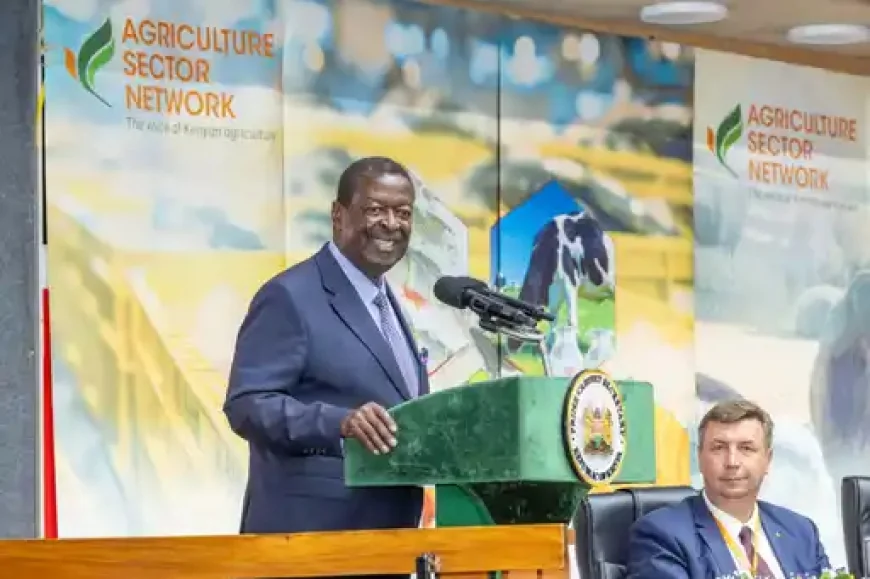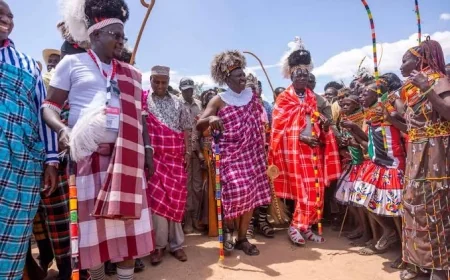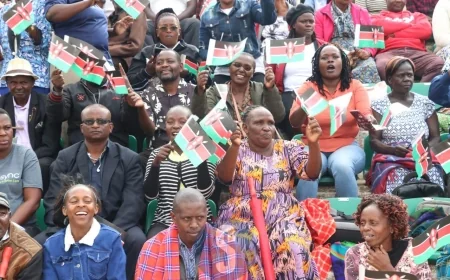Mudavadi: Kenya must go digital to revolutionise Agriculture

Prime Cabinet Secretary Musalia Mudavadi has underscored the need for Kenya to urgently embrace innovation, data, and technology as the future of agriculture.
Speaking on Friday during the National Agribusiness Excellence Awards at the fifth National Agribusiness Summit held in Nairobi, Mudavadi said his office is working with the Ministry of Agriculture and other national and international institutions to build integrated digital ecosystems that will transform service delivery within the agricultural sector
These systems are expected to support farmer registration, e-extension, digital input access, and real-time market intelligence.
“For agriculture to thrive, partnerships must deepen, and coordination must strengthen. The Government alone cannot achieve the transformation we seek,” Mudavadi said.
He urged the private sector to take a leading role in investment, processing, and logistics while calling on development partners to continue supporting financing, capacity building, and knowledge sharing.
He also emphasised the importance of empowering county governments to implement programmes at the grassroots level where real transformation happens.
“My Office remains committed to facilitating coordination across all these actors. We will continue to bridge the gap between policy and practice, ensuring that every initiative is aligned, efficient, transparent, and results-oriented. This approach will ensure that national ambitions translate into tangible benefits for farmers and rural communities,” he explained.
Mudavadi urged counties to invest in agricultural data platforms that align with national systems such as the Kenya Integrated Agricultural Management Information System and the National Farmer Registration System.
“These will ensure that planning and resource allocation are based on credible data and that every farmer in Kenya is visible, reachable, and supported effectively,” he said.
He highlighted the role of innovation hubs and incubators in linking youth-led startups and agri-tech innovators with public programmes, financial institutions, and investors ready to scale transformative ideas.
Mudavadi also emphasised value addition and agro-processing, saying Kenya can no longer afford to export raw produce only to import processed goods at a premium.
“We are promoting local manufacturing and agro-processing to ensure that more value is retained within our borders. By supporting the establishment of cottage industries, cold storage facilities, and agro-industrial parks, we are not only improving farm incomes but also creating sustainable employment, especially for women and young people who are the future of this nation,” he said.
He noted that agriculture remains the cornerstone of Kenya’s national development agenda, the heartbeat of rural economies, and the foundation upon which millions of livelihoods depend.
Despite its significance, he regretted that agriculture has long been viewed merely as a means of survival and called for its repositioning as a competitive, profitable, and technology-driven business sector capable of powering national transformation.
He said the government has made deliberate policy commitments to drive this transition through the Agricultural Sector Transformation and Growth Strategy (ASTGS) and the Bottom-Up Economic Transformation Agenda (BETA), which seek to strengthen value chains, market systems, and rural infrastructure.
“These frameworks are helping us to align county and national interventions, eliminate duplication, and deliver tangible results for our farmers and agripreneurs,” he explained.
For decades, our farmers have remained price-takers in their own markets, vulnerable to exploitation and volatility. This must change,” he insisted.
He said the government is strengthening aggregation centres, cooperatives, and digital marketplaces to connect smallholder farmers directly to buyers, processors, and exporters, enabling them to negotiate better prices and access new markets
This year’s summit brought together leaders from government, the private sector, academia, and development partners under the theme “From Promise to Action: Advancing Agribusiness through Dialogue and Innovation.”
What's Your Reaction?
 Like
0
Like
0
 Dislike
0
Dislike
0
 Love
0
Love
0
 Funny
0
Funny
0
 Angry
0
Angry
0
 Sad
0
Sad
0
 Wow
0
Wow
0






























